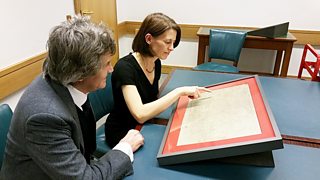Taking Liberties Season on the Βι¶ΉΤΌΕΔ: Magna Carta 800
Martin Davidson
Commissioning Editor, History
Tagged with:

Melvyn Bragg records Magna Carta for Βι¶ΉΤΌΕΔ Radio 4
What we love most about the Middle Ages is their glorious (and gory) distance from the modern world. Not for nothing is Game of Thrones held up as the ‘best drama about the Wars of the Roses’ even with its dragons, ‘gods old and new’, and 1,000 mile ice wall. It’s us, but not us. The castles, and the suits of armour, may be satisfyingly tangible, but they really come to life in the wildest fantasy – and have done so for centuries.
So it’s something of a surprise to be told our entire way of life – everything we hold dearest about freedom, liberty and justice – derives from a single sheep’s skin manuscript, covered in arcane medieval Latin, which is celebrating its 800th anniversary this year. Magna Carta – ‘The Great Charter’. Cue, a small island on the river Thames, and a group of angry, well-armed knights forcing a recalcitrant, and very bad King John to sign a document curbing his own arbitrary powers. Actually, he didn’t sign it, of course, he set his seal to it; and in fact, there was no document, per se, that day in June 1215, only the promise of one. But once that royal seal was attached, a vital principle entered into national political life – global political life in due course – and that was, simply, nobody was above the law, least of all the King. All those tyrants, emperors, and ancient kings who wielded cruel and non-negotiable power, free to dispose of their subjects as they chose – suddenly, it was they who were history, at least in theory. And from Magna Carta’s core idea would be built (after centuries of dispute, it has to be said, including revolutions and civil war) many of the pillars of the modern world. The fact our leaders cannot imprison us on a whim, for example. Long after King John – and his rebellious barons – were dead and buried, that principle would motivate the parliamentary opposition to Charles I; it would provide the central idea embodied by the Founding Fathers of the new United States of America; and it would offer justification to the protest movements of Mahatma Gandhi, and Nelson Mandela – among many, many others.
That is why we feel this is no ordinary anniversary. The story of how the Magna Carta came to be conceived in the first place, never mind sealed and implemented, is fascinating enough in its own right, and one we shall be addressing directly, on radio, television, and online. But it’s the story of its impact on the following 800 years which really astonishes. That is why our coverage will range far and wide – touching on everything from an exploration of the institution that most directly claims direct lineage from the Magna Carta – our Houses of Commons – to examples from around the globe of just how tendentious these principles remain in the contemporary world, from China, to Zimbabwe, and beyond.
Working closely with our partners – and the – we’ve made the season relevant to people of all ages. From David Starkey and Melvyn Bragg looking back at its history; to , Βι¶ΉΤΌΕΔ Three comedy and Radio 1 supporting the British Library's Magna Carta: My Digital Rights project, to our news and current affairs offerings in Democracy Day on the 20th January - the season will promote understanding and debate around today’s democratic process.
Magna Carta’s legacy is as profound in its spirit, as it is in its letter. Ordinary people talk to power, we have the right to criticise those who claim to represent us, we are even allowed to ridicule them, and all without fear of imprisonment or torture. This too must stand as one of the most important consequences of that fateful encounter between king and magnates 800 years ago, though not one any of the original participants would remotely have anticipated, or, arguably, approved of. But still it stands. A tribute to the power of an idea, which once unleashed, can change the world out of all recognition.
Martin Davidson is Βι¶ΉΤΌΕΔ Commissioning Editor, History
Programmes in the season include David Starkey's on Βι¶ΉΤΌΕΔ Two, and Melvyn Bragg's for Βι¶ΉΤΌΕΔ Radio 4.
- See the for more details
- Read the
